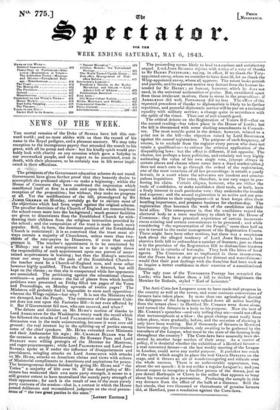The prospects of the Government education scheme do not mend.
Government have given further proof that they honestly desire to accomplish the professed object—to make a beginning ; within the House of Commons they have confirmed the impression which manifested itself at first in a calm and upon the whole impartial reception of the proposition; but without, they make no progress at all. Yet the modifications of the bill, promulgated by Sir
• Awes GRAHAM on Monday, certainly go far to obviate most of the objections which had been urged against the original scheme. The peculiar doctrines of the Church of England are removed from the school-room more into the background ; much greater facilities are given to dissentients from the Established Church for with- drawing their children from the religious instruction provided by the school ; and the composition of the trust is made much more popular. Still, in form, the dominant position of the Established Church is maintained : it is so contrived that the trust must al- ways contain a majority of Churchmen, unless more than two- thirds of the rate-payers be Dissenters, if even that would prevent it. The teacher's appointment is to be sanctioned by a Bishop : not a bad arrangement in so far as it might throw the responsibility of such appointment upon one person of ascer- tained acquirements in learning ; but then the Bishop's sanction must not stray beyond the pale of the Established Church— the teacher must be a Church-of-England man, and none other however highly qualified. Thus the Church is fettered, but still kept on the throne ; so that she is exasperated while her opponents are unsatisfied. The petitioning against the educational clauses continues—a perfect storm : the list of places from which hostile petitions were presented on Friday filled ten pages of the Votes and Proceedings, on Monday upwards of twelve pages ! The Ministers will probably find it impossible to stem such opposition : whereat the Whigs rejoice—but why ? It is not the Ministers who are damaged, but the People. The existence of the present Cabi- net does not rest upon the Factories Bill—is not even affected by it. But if Government fail now, who can succeed, and when ?
The debate and division on Mr. Humes motion of thanks to Lord ASHBURTON for the Washington treaty mark the recoil which has followed the attacks of Lord PALMERSTON and his allies. The discussion was in the main uninteresting, because it went over old ground : the real interest lay in the splitting-up of parties among some of the chief speakers. Mr. HUME extended over Ministers and their Ambassador his aegis; Mr. CHARLES BULLER was for the occasion a sturdy Ministerialist ; Sir ROBERT PEEL and Lord STANLEY were willing proteges of the Member for Montrose, and eager peacemongers ; while Lord PALMERSTON and Lord JOHN RUSSELL spoke as if under the influence of disappointment and peevishness, mingling attacks on Lord ASHBURTON with attacks on Mr. Hume, attacks on American claims and views with echoes of Ministerial compliments to Americans and aspirations for peace. The heterogeneous debate finished by giving Mr. HUMS and "the Tories" a.majority of 238 over 96. If the fiscal policy of Mi- nisters has weakened their own mere party strength, it seems to a still greater extent to have neutralized the merely party strength of their opponents ; for such is the result of one of the most purely party contests of the session—that is, a contest in which the House passed deliberate and reconsidered judgment on the rival preten- sions of " the two great parties in the state."


























